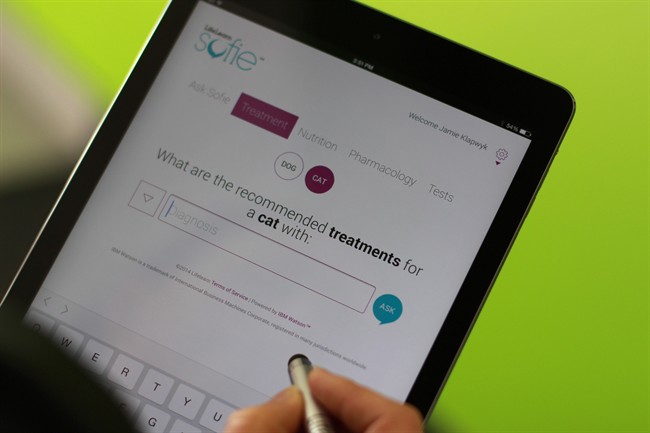TORONTO – Canadian pet owners may soon be seeing a new presence at their local vet clinic one they may be inclined to call Dr. Watson.

The IBM-designed, cognitive computing technology that trounced human competitors on “Jeopardy!” three years ago is preparing to make its debut in a variety of public settings ranging from life insurance firms to retail stores.
A company based in Guelph, Ont., is determined to pave Watson’s path into the world’s animal care facilities, where it expects the technology to play a role in helping vets determine treatment options for their furry and feathered patients.
Watson has already been performing this function in hospitals designed for human care in the years since it made headlines by roundly defeating two skilled competitors on “Jeopardy!” in February 2011.
Applications powered by Watson respond to questions posed in natural language by trolling through a database comprised of medical journals, textbooks, patient records and other authoritative sources of relevant information.
Veterinary technology company LifeLearn argues that animal doctors have an even greater need for such a tool than their peers treating humans.
Chief Veterinarian Mark Stephenson said those providing animal care tend to be medical generalists by training and have a particularly difficult time keeping up to the ever-expanding body of scientific literature in their field.
“We have very few specialists with veterinary medicine, and therefore we are essentially cardiologists at the same time as dermatologists at the same time as pharmacists at the same time as often running our own business,” Stephenson said in a telephone interview.
“We’re wearing many different hats, and that just compounds the difficulty we have in keeping up to date with the volumes of information that already exist within veterinary medicine.”
LifeLearn’s project is one of many due to be unveiled on Wednesday at the opening of IBM’s global Watson headquarters in New York City.
The Watson team, consisting of nearly a thousand people worldwide, has been working with companies in fields as diverse as retail, travel and finance, to develop customized apps all powered by a unique brand of artificial intelligence.
Robin Grosset, an IBM Distinguished Engineer and Watson analytics specialist based in Ottawa, says the public can expect to see what the technology is truly capable of as it gradually filters down into public settings.
Some people may see Watson as an equivalent to Apple’s personal assistant technology Siri, which can perform search functions based on commands given in natural language.
Grosset explains that Watson’s power lies in the ability to learn from its interactions with humans and make intelligent connections based on the information in its database.
“Don’t think of it like a search engine,” he cautioned. “It’s actually able to perform reasoning over a body of information. It’s able to find relevance in complexity. A needle in a haystack is sometimes the way we describe it.”
The core of Watson’s reasoning power is the database of relevant information that it’s given to mine.
Grosset explained that companies are able to choose the information that’s relevant to their own fields and fill databases accordingly.
A retail store, for instance, could develop a Watson-based app loaded with information about the merchandise they offer, the materials they’re made of and the technical specifications of those materials.
Grosset said that app could then be used to help customers make more informed purchases.
“There are sometimes a lot of choices available to people as they’re purchasing things,” he said. “And there can be technical points as well where the purchaser needs to figure out, ‘what’s the best backpack if I’m going to the Himalayas, and I’m going to be in -25 centigrade, and I need a 35-litre capacity?'”
That exact function is at the heart of one of the many projects being unveiled on Wednesday.
Other applications include an Australian university using Watson to help students get acquainted with its programs, a U.S.-based travel adviser using Watson to help clients plan their trips, and a Thai cancer treatment centre using the technology to help advise its medical staff.
LifeLearn’s app, dubbed Sofie after the Greek word for wisdom, will perform a similar function in veterinary clinics.
Stephenson said the app will initially only be used to search for different treatment options based on a pre-existing diagnosis, but hopes it can eventually serve as a diagnostic tool as well.
He said the app, designed to run on tablets, mobile phones and computers, is meant to enhance rather than replace the care provided by real-life doctors.
“It’s up to the vet to use their cognitive skills to decide which is the absolute best option for that patient, because so many things affect it like cost of treatment, the actual patients themselves and what they’re able to tolerate, the amount of time to treat it, the owners’ expectations, etc.,” he said.
LifeLearn’s Sofie app is currently in beta-testing with a handful of clients, including operations in Alberta and Ontario.
Stephenson said clients may be able to see the technology at work in local vet clinics as early as next year.

Comments